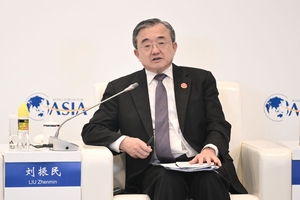Q&A: China’s Climate Envoy Says Having a Result Better Than No Deal
Listen to the full version

On Nov. 24, the 29th United Nations Climate Change Conference (COP29) concluded with a finance agreement where developed countries pledged to provide at least $300 billion annually to support climate action in developing countries by 2035.
Liu Zhenmin, China’s top climate negotiator, acknowledged that while there remains a substantial gap between the financial commitments made and the estimated needs of developing countries — which is around $1 trillion, the resolution nonetheless ensures that multilateral cooperation on climate change can continue to advance.

Unlock exclusive discounts with a Caixin group subscription — ideal for teams and organizations.
Subscribe to both Caixin Global and The Wall Street Journal — for the price of one.
- DIGEST HUB
- COP29 concluded with a climate finance agreement for developed countries to provide $300 billion annually to support climate actions in developing nations by 2035, despite an estimated need of $1 trillion.
- China has contributed 177 billion yuan ($24.3 billion) since 2016 to support other developing nations and emphasizes a leading role in climate cooperation without changing its developing country status.
- With potential U.S. shifts in climate policy, China remains open to continued local-level collaboration, though stressed global cooperation should remain inclusive.
The 29th United Nations Climate Change Conference (COP29) concluded with a significant finance agreement, pledging developed countries to provide at least $300 billion annually for climate actions in developing countries by 2035. However, China's top climate negotiator, Liu Zhenmin, noted that this is still less than the $1 trillion needed. Despite this, the agreement signifies continued multilateral cooperation on climate change [para. 1][para. 2]. Liu, who assumed his role as China's Special Envoy for Climate Change in January, emphasized that having an outcome, albeit imperfect, is better than no result at all [para. 3][para. 4].
The finance agreement, called the New Collective Quantified Goal, also encourages voluntary contributions from developing countries, highlighting the principle of common but differentiated responsibilities (CBDR). China has consistently upheld this principle [para. 5]. China announced at COP29 that it has provided over 177 billion yuan ($24.3 billion) since 2016 to assist developing countries in their climate responses. This contribution underscores China's growing role in global climate leadership and its commitment to South-South cooperation [para. 6][para. 7].
Despite its enhanced role, Liu reiterated that China remains a developing country with ongoing investment needs for its energy transition [para. 8]. He opposed any further classification of developing countries, labeling it as unfair, and stressed that China's contributions differ from developed countries as they are voluntary rather than obligatory under international agreements [para. 9][para. 10]. China has been a significant contributor to the global renewable energy increase, leading in production and affordability of clean energy technologies [para. 11][para. 12].
China aims to balance its status as a developing nation with proactive global leadership by signing ambitious Nationally Determined Contribution (NDC) commitments and ensuring ongoing assistance to other developing countries within its capacity [para. 13][para. 14]. Liu affirmed that China would continue to uphold the principle of CBDR and protect both its own and developing countries' interests, all while contributing to global climate initiatives [para. 15].
As for the possibility of Donald Trump's return as U.S. President, Liu warned of the implications if the U.S. withdraws from the Paris Agreement. Nevertheless, he remained hopeful about potential subnational cooperation between China and the U.S. in areas such as geothermal technology and carbon capture, despite federal changes [para. 16][para. 17][para. 18]. While facing geopolitical challenges, Liu emphasized that the continuity of China-U.S. climate cooperation depends on established local-level partnerships and mutual trust beyond official mechanisms [para. 19][para. 20].
In conclusion, COP29 reinforced China's commitment to global climate financing and maintaining the division of responsibilities between developed and developing countries. It showcased China's steadfast participation and leadership in climate negotiations and action, while still acknowledging its developmental needs [para. 21][para. 22].
- Since 2016:
- China has provided and mobilized more than 177 billion yuan ($24.3 billion) in project funds to support other developing countries' climate response.
- January 2025:
- Liu Zhenmin assumed the role of China's Special Envoy for Climate Change.
- January 2025:
- Donald Trump set to return to the White House.
- PODCAST
- MOST POPULAR






